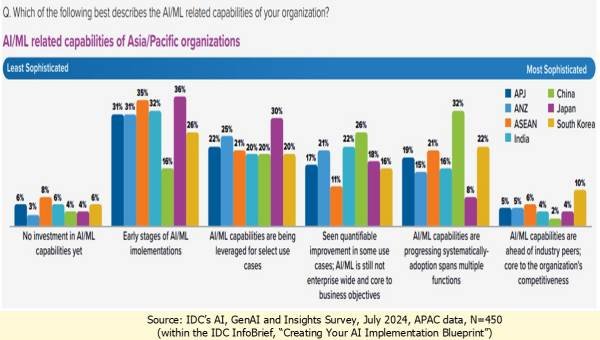เดลล์ เทคโนโลยีส์ (NYSE: DELL) และ NVIDIA มอบหมายให้ IDC ทําการวิเคราะห์อย่างครอบคลุมเกี่ยวกับแนวโน้มการนํา AI ไปใช้ในองค์กรทั่วทั้งเอเชียแปซิฟิก พร้อมให้คําแนะนําเชิงกลยุทธ์สําหรับธุรกิจเกี่ยวกับการขับเคลื่อนความสําเร็จด้าน AI ร่วมกับพันธมิตรด้านเทคโนโลยี ผลการศึกษาดังกล่าวได้ถูกเผยแพร่ใน IDC InfoBrief เรื่องการสร้างต้นแบบการใช้งาน AI ของคุณ (Creating your AI Implementation Blueprint) (เอกสาร ##AP242506IB, มกราคม 2025)
AI, GenAI และ แมชชีน เลิร์นนิ่ง กําลังเปลี่ยนแปลงอุตสาหกรรมทั่วเอเชียแปซิฟิก แต่หลายองค์กรต้องดิ้นรนกับปัญหาการขาดแคลนบุคลากร ความซับซ้อนในการผสานรวมการทำงาน และการปรับกลยุทธ์ AI ให้สอดคล้องกับวัตถุประสงค์ทางธุรกิจ IDC InfoBrief “การสร้างต้นแบบการใช้งาน AI ของคุณ” ซึ่งได้รับมอบหมายจาก เดลล์ เน้นย้ำว่าพันธมิตรด้านเทคโนโลยีสามารถช่วยให้ธุรกิจเชื่อมช่องว่างเหล่านี้ได้อย่างไร เพื่อให้มั่นใจว่ากระบวนการนํา AI มาใช้เป็นไปอย่างราบรื่น
ปลดล็อกศักยภาพสูงสุดของ AI: ข้อมูลเชิงลึกที่สําคัญจาก “การสร้างต้นแบบการใช้งาน AI ของคุณ”
เมื่อมีการนํา AI มาปรับใช้ขยายตัวเร็วขึ้นทั่วทั้งเอเชียแปซิฟิก หลายองค์กร กำลังเข้าถึงการใช้กลยุทธ์การผสานรวมมากขึ้น โดยให้ความสำคัญไปที่กรณีการใช้ GenAI ช่วยเพิ่มประสิทธิภาพการดําเนินงาน เพิ่มมูลค่าให้กับผลิตภัณฑ์ และส่งมอบประสบการณ์ลูกค้าแบบเฉพาะบุคคล
อย่างไรก็ตาม การนํา AI ไปใช้นั้นไม่ได้ปราศจากความท้าทายโดยสิ้นเชิง – องค์กรธุรกิจยังคงต้องเผชิญกับปัญหาการขาดแคลนบุคลากรที่มีทักษะ โดยเฉพาะอย่างยิ่งในตลาดที่พัฒนาแล้วซึ่งมีการแข่งขันเพื่อแย่งชิงผู้เชี่ยวชาญด้าน AI ทําให้เกิดต้นทุนที่สูงขึ้น นอกจากนี้ ความสําเร็จของความคิดริเริ่ม AI แล้ว ยังขึ้นอยู่กับความพร้อมใช้งาน คุณภาพ และการกํากับดูแลข้อมูล การจัดการกับปัจจัยเหล่านี้ผ่านการผสมผสาน ระหว่างการลงทุนภายในและความร่วมมือภายนอกเป็นกุญแจสําคัญในการปลดล็อกศักยภาพของ AI อย่างเต็มที่
IDC InfoBrief ได้สรุปการค้นพบที่สําคัญหลายประการเกี่ยวกับการนํา AI มาใช้ในเอเชียแปซิฟิก:
AI และ GenAI ขับเคลื่อนนวัตกรรมทางธุรกิจ: การนํา AI มาใช้เพิ่มมากขึ้นในภูมิภาค โดยเฉพาะตลาดเซิร์ฟเวอร์ที่เน้นการใช้ AI ในเอเชียแปซิฟิก คาดว่าจะมีมูลค่าสูงถึงประมาณ 23,900 ล้านดอลลาร์สหรัฐภายในปี 2025 ส่วนการใช้จ่ายในเอเชียแปซิฟิกใน GenAIได้รับแรงผลักดันเช่นกัน โดย 84% ขององค์กรในเอเชียแปซิฟิกในปีนี้ตั้งใจจะจัดสรรระหว่าง 1 ถึง 2 ล้านดอลลาร์สหรัฐ เพื่อใช้สําหรับโครงการริเริ่มของ GenAI ในขณะที่องค์กรทั่วโลกใช้งบประมาณราว 33% กับ GenAI แต่ ในเอเชียแปซิฟิกจัดสรรให้งบประมาณให้กับ GenAI เพียง38% ของงบประมาณที่ใช้กับ AI ทั้งหมด หากเทียบกับการใช้งบประมาณไปกับ AI กลุ่มคาดการณ์และการตีความที่ 61% แม้ว่าองค์กรธุรกิจต่างๆ จะเห็นศักยภาพมากมายในการเพิ่มประสิทธิภาพการทํางานและการมีส่วนร่วมของลูกค้าด้วยเทคโนโลยีเหล่านี้ แต่หลายคนยังคงเผชิญกับความท้าทายในการปรับความคิดริเริ่ม AI ให้สอดคล้องกับเป้าหมายเชิงกลยุทธ์และรวม AI เข้ากับเวิร์กโฟลว์ที่มีอยู่ ในขณะที่ 35% ขององค์กรในอาเซียนอยู่ในช่วงเริ่มต้นของการนํา AI และแมชชีนเลิร์นนิ่งไปใช้ และ 21% ขององค์กรที่ตอบแบบสำรวจนี้ มองว่าความสามารถของพวกเขามีความก้าวหน้าอย่างเป็นระบบแล้ว ด้วยการนำ AI ปรับใช้งานในหลายฟังก์ชั่น
กลยุทธ์การปรับใช้ AI ที่กำลังพัฒนาขึ้น: กลยุทธ์การปรับใช้ AI และ GenAI กําลังพัฒนาในเอเชียแปซิฟิก โดยมีคลาวด์สาธารณะ (รวมถึงมัลติคลาวด์) เป็นตัวเลือกอันดับต้น ๆ ในปี 2024 อย่างไรก็ตาม มีความต้องการที่เพิ่มขึ้นสําหรับ AI ส่วนตัวและการปรับใช้ในองค์กร ซึ่งขับเคลื่อนด้วยความปลอดภัย ประสิทธิภาพด้านต้นทุน การแบ่งปันข้อมูลและการทํางานร่วมกันที่ได้รับการปรับปรุง และข้อกําหนดเฉพาะของอุตสาหกรรม ธุรกิจกําลังเปลี่ยนจากโมเดล AI ทั่วไปเป็นแบบพิเศษ โดยประธานเจ้าหน้าที่ฝ่ายสารสนเทศ (CIO) ให้ความสำคัญกับความปลอดภัยของข้อมูลเป็นอันดับแรก ความสมบูรณ์ของระบบ และตัวเลือกโครงสร้างพื้นฐานที่ปรับให้เหมาะสมในสภาพแวดล้อมที่เป็นสาธารณะ ทั้งแบบมัลติคลาวด์ แบบไฮบริดและไพรเวทคลาวด์
ความท้าทายและข้อควรพิจารณาที่สําคัญในการขยายขีดความสามารถ AI และ GenAI: องค์กรต้องเผชิญกับข้อกังวลที่สําคัญเมื่อ GenAI มีการขยายขีดความสามารถ ต้นทุนด้านไอทีที่เพิ่มขึ้น นอกจากนี้ยังมีเรื่องความเสี่ยงด้านกฎระเบียบและข้อบังคับต่างๆ ในขณะที่ ต้องบรรลุข้อผูกพันด้านประสิทธิภาพการใช้พลังงานด้วย รวมถึงการขาดแคลนทักษะสามารถทำให้การเปลี่ยนผ่านสู่ยุคดิจิทัลล่าช้าลงได้ ทําให้การพัฒนาผลิตภัณฑ์ช้าลง และส่งผลกระทบต่อผลลัพธ์ด้านคุณภาพ – มากกว่า 72% ขององค์กรในเอเชียแปซิฟิกเน้นย้ําถึงความจําเป็นในการใช้ข้อมูลและความรู้ด้าน AI ในการจ้างงานใหม่ๆ เพื่อลดช่องว่างการขาดแคลนบุคลากรที่มีทักษะด้าน AI ทั้งนี้ความปลอดภัยและความเป็นส่วนตัวยังคงเป็นข้อกังวลหลัก ทีมไอทีต้องเพิ่มความพร้อมสําหรับการนํา GenAI มาใช้ ในขณะที่องค์กรคาดหวังให้ผู้ให้บริการภายนอกรับรองความปลอดภัยของระบบ AI ไม่ว่าจะเป็นความเป็นส่วนตัว ความน่าเชื่อถือ การปรับปรุงโครงสร้างพื้นฐานให้ทันสมัย และการพัฒนา AI โมเดลแบบกําหนดเอง แม้จะมีความท้าทาย แต่องค์กรธุรกิจยังคงมองว่า GenAI คุ้มค่ากับความพยายาม เนื่องจากเป็นตัวขับเคลื่อนประสิทธิภาพการดําเนินงาน ความพึงพอใจของลูกค้าที่ดีขึ้นและการสร้างธุรกิจรูปแบบใหม่
การวางรากฐานสําหรับความสําเร็จของ AI: องค์กรในเอเชียแปซิฟิกกําลังใช้แนวทางที่แนวทางที่เป็นระบบและแบ่งเป็นขั้นตอนในการนํา AI มาใช้งาน โดยจัดลําดับจากความสําคัญของกรณีการใช้งานที่มีผลกระทบสูงและให้ผลตอบแทนที่วัดผลได้ในขณะเดียวกันก็สามารถบริหารจัดการความเสี่ยงได้อย่างมีประสิทธิภาพ การวางรากฐาน AI ที่แข็งแกร่งต้องอาศัยการผสมผสานที่ลงตัวระหว่าง บุคลากร, กระบวนการ และเทคโนโลยี โดยมีประเด็นสำคัญที่ต้องให้สำคัญ ได้แก่ การลงทุนในโครงสร้างพื้นฐาน AI ที่พร้อมใช้งาน การปลูกฝังทีมที่เน้นให้ความสำคัญกับ AI เป็นหลัก การปรับกลยุทธ์ AI ให้สอดคล้องกับเป้าหมายทางธุรกิจ และการใช้การกํากับดูแลข้อมูลที่แข็งแกร่งเพื่อขับเคลื่อนการตัดสินใจและความสําเร็จของ AI ในระยะยาว
การพึ่งพาความเชี่ยวชาญด้าน AI เฉพาะทางเพื่อเอาชนะความท้าทาย: ธุรกิจในเอเชียแปซิฟิกตระหนักถึงคุณค่าของการเป็นพันธมิตรกับผู้เชี่ยวชาญเชิงกลยุทธ์เพื่อสร้างโครงสร้างพื้นฐานที่ปรับขนาดได้และลดช่องว่างด้านทักษะ ปัจจุบันองค์กรต่างๆ กล่าวถึงปัญหาการขาดแคลนบุคลากร ความกังวลเกี่ยวกับข้อมูลส่วนบุคคลและความซับซ้อนในการผสานรวมเป็นอุปสรรคสําคัญต่อความสําเร็จของ AI ธุรกิจจํานวนมากในภูมิภาคเอเชียแปซิฟิกพึ่งพานักพัฒนาแปพลิเคชั่นจากภายนอก (60%) ในขณะที่มีเพียง 30% เท่านั้นที่พัฒนาแอปพลิเคชั่น AI ภายในองค์กร และประมาณ 10% ใช้โซลูชัน AI สำเร็จรูปเชิงพาณิชย์ (commercial off-the-shelf : COTS) องค์กรที่ประสบความสําเร็จกําลังมองหาหาพันธมิตรด้านเทคโนโลยีสําหรับ AI โรดแมป โครงสร้างพื้นฐานที่แข็งแกร่งและยืดหยุ่น การสนับสนุนการใช้งานจากผู้เชี่ยวชาญและการฝึกอบรมบุคลากรเพื่อลดช่องว่างด้านความสามารถภายในองค์กรและเร่งการปรับใช้ AI ผู้จำหน่ายเทคโนโลยีที่นําเสนอโซลูชันที่ครอบคลุม สามารถปรับเปลี่ยนได้ และปรับขนาดได้จะอยู่ในตําแหน่งที่ได้เปรียบในการตอบสนองต่อความต้องการทางธุรกิจเหล่านี้ที่เปลี่ยนแปลงไป
การค้นพบที่สําคัญของแต่ละอุตสาหกรรม: อุตสาหกรรมธนาคารและบริการทางการเงิน, อุตสาหกรรมการผลิต, อุตสาหกรรมพลังงาน, อุตสาหกรรมเฮลท์แคร์, อุตสาหกรรมค้าปลีก
อุตสาหกรรมต่างๆ ในภูมิภาคเอเชียแปซิฟิกกําลังถูกเปลี่ยนแปลงโดย AI, GenAI และแมชชีน เลิร์นนิ่ง โดยองค์กรต่างๆ นํา AI มาปรับใช้เป็นกลยุทธ์เพื่อขับเคลื่อนการดำเนินงาน สร้างประสบการณ์ที่ดีให้กับลูกค้าและพัฒนานวัตกรรม ภูมิภาคนี้กําลังนํากรณีตัวอย่างการใช้งาน GenAI มาใช้ในองค์กรอย่างรวดเร็ว โดย 87.4% ขององค์กรในภูมิภาคเอเชียแปซิฟิกปรับใช้ GenAI จากกรณีศึกษา มากกว่า 10 กรณีในปี 2024 และ 25.6% กล่าวว่าพวกเขาจะมีกรณีตัวอย่างการใช้งาน GenAI มากกว่า 100 กรณีในปี 2025 กรณีตัวอย่างการใช้งานเหล่านี้ครอบคลุมหลากหลายหน้าที่ทางธุรกิจ รวมถึงการดําเนินงานด้านไอที การตลาด การจัดการซัพพลายเชน ทรัพยากรบุคคล และอื่นๆ โดยผู้นําธุรกิจจะกลายเป็นผู้มีอำนาจในการตัดสินใจที่สำคัญ
อุตสาหกรรมธนาคารและบริการทางการเงิน: กลุ่มนี้เป็นผู้นําด้านการนํา AI และ GenAI มาใช้ในภูมิภาคเอเชียแปซิฟิก โดย 84% ขององค์กรเหล่านี้ใช้ AI อยู่แล้ว และ 67% กำลังปรับใช้ GenAI ส่วน 72% ของผู้เชี่ยวชาญด้านอุตสาหกรรมธนาคารและบริการทางการเงินในภูมิภาคเอเชียแปซิฟิกเชื่อว่า GenAI ดิสรัปกลุ่มนี้ในอีก 18 เดือนข้างหน้า แอปพลิเคชันหลัก ได้แก่ การตรวจจับการฉ้อโกง การต่อต้านการฟอกเงิน และการปรับปรุงประสิทธิภาพการดําเนินงาน ด้วยการใช้จ่ายของ AI และ GenAI ในบริการทางการเงินที่คาดว่าจะเติบโตที่อัตราแบบทบต้นต่อปี (CAGR) ที่ 25 – 31% ตั้งแต่ปี 2023 ถึง 2028 องค์กรต่างๆ กําลังปรับขนาดความคิดริเริ่มด้าน AI ในหลายฟังก์ชัน ตั้งแต่การบริการลูกค้าและการสรรหาบุคลากร ไปจนถึงการจัดซื้อจัดจ้างและการปฏิบัติตามกฎหมาย ธนาคารสนับสนุนการเขียนโซลูชั่น AI (47.8%) ซึ่งองค์กรจะนำโมเดล GenAI ที่มีอยู่มาปรับแต่งบนแพลตฟอร์ม AI แบบองค์กร เพื่อสร้างความยืดหยุ่น แต่ยังคงต้องการการสนับสนุนจากผู้เชี่ยวชาญด้านความปลอดภัย การจัดการข้อมูล และโครงสร้างพื้นฐาน
อุตสาหกรรมการผลิต: 78% ของผู้ผลิตในภูมิภาคเอเชียแปซิฟิกที่ใช้ AI และ 54% ใช้ GenAI อุตสาหกรรมกําลังขับเคลื่อนการเพิ่มประสิทธิภาพซัพพลายเชน การบํารุงรักษาเชิงคาดการณ์ และการควบคุมคุณภาพ การคาดการณ์ความต้องการที่ขับเคลื่อนด้วย AI และการตรวจสอบการผลิตแบบเรียลไทม์ช่วยลดเวลาหยุดทํางาน ลดของเสียและเพิ่มความแม่นยําในการปฏิบัติงาน โดย 49% ของผู้ผลิตชอบสร้างโซลูชั่น AI ขึ้นเอง และมองหาผู้เชี่ยวชาญเฉพาะทางในระบบบริหารการผลิต (MES) การรวมซัพพลายเชน และการเพิ่มทักษะของพนักงาน โดย 52% ของผู้ผลิตเชื่อว่า GenAI จะเข้ามาดิสรัปส่วนนี้ภายใน 18 เดือน มีการเร่งการผลิตอัตโนมัติ การให้คะแนนลูกค้าเป้าหมายเชิงคาดการณ์ และดิจิทัล ทวิน โมเดล–ความก้าวหน้าในการผลิตอย่างชาญฉลาดและสายการผลิตที่คล่องตัวและมีความแม่นยําสูง
อุตสาหกรรมพลังงาน: อุตสาหกรรมภาคพลังงานของภูมิภาคเอเชียแปซิฟิกกําลังนํา AI (83%) และ GenAI (73%) มาใช้เพื่อปรับปรุงการเพิ่มประสิทธิภาพกริดการบํารุงรักษาเชิงคาดการณ์และการกระจายพลังงานปรับปรุงประสิทธิภาพและลดเวลาหยุดทํางาน โดย 42% ของบริษัทพลังงานกําลังปรับแต่งโมเดลอย่างละเอียดซึ่งใช้ข้อมูลขององค์กรเพื่อปรับปรุงสมาร์ทกริดและแพลตฟอร์มพลังงาน บริษัทพลังงานหลายแห่งพึ่งพาผู้จำหน่ายเทคโนโลยีภายนอกเนื่องจากช่องว่างด้านทักษะและโครงสร้างพื้นฐาน ซึ่งต้องการการสนับสนุนเฉพาะทางสําหรับการจัดการข้อมูลและการเพิ่มทักษะของพนักงาน ทั้งนี้ 54% เชื่อว่า GenAI จะดิสรัปโมเดลธุรกิจของพวกเขาในอีก 18 เดือนข้างหน้า กรณีของตัวอย่างการใช้งานยอดนิยม ได้แก่ การเปิดใช้งานการขาย ความปลอดภัยทางไซเบอร์ การจัดการความเสี่ยงที่ได้รับการปรับปรุง และดิจิทัล ทวิน โมเดล การลงทุนในโครงสร้างพื้นฐาน AI และแนวทางปฏิบัติด้าน AI อย่างมีความรับผิดชอบเป็นสิ่งสําคัญ โดยบริษัทระดับโลกสร้างฮับ AI ในภูมิภาคเอเชียแปซิฟิกเพื่อขับเคลื่อนนวัตกรรมในการจัดการกริดและเร่งการเปลี่ยนผ่านไปสู่พลังงานสะอาด
กลุ่มอุตสาหกรรมเฮลท์แคร์: 86% ของบริษัทเฮลท์แคร์ในภูมิภาคนี้กําลังใช้ AI โดย 59% นํา GenAI มาใช้เพื่อปรับปรุงการวินิจฉัย การวิเคราะห์เชิงคาดการณ์ และแผนการรักษาเฉพาะบุคคล กรณีตัวอย่างการใช้งานที่ขับเคลื่อนด้วย AI เช่น การตรวจสอบผู้ป่วยแบบเรียลไทม์และการคาดการณ์ความต้องการ ช่วยเพิ่มความคล่องตัวให้กับเวิร์กโฟลว์ ลดข้อผิดพลาดและปรับปรุงการดูแลผู้ป่วย โดย 58.2% ขององค์กรกลุ่มเฮลท์แคร์สร้างโซลูชั่นAI ขึ้นเอง โดยปรับแต่งให้เหมาะกับความต้องการเฉพาะทาง เช่น การวินิจฉัย ในขณะที่ผู้จำหน่ายเทคโลยีช่วยแก้ไขช่องว่างด้านทักษะ AI และความซับซ้อนด้านกฎระเบียบ ซึ่ง 67% ของบริษัทกลุ่มนี้เชื่อว่า GenAI จะดิสรัปรูปแบบธุรกิจภายใน 18 เดือน การลงทุนด้าน AI คาดว่าจะเพิ่มขึ้น โดยเฉพาะอย่างยิ่งในด้านความเป็นเลิศทางคลินิก ประสิทธิภาพการดําเนินงาน และการเพิ่มประสิทธิภาพทางการเงิน ซึ่งช่วยให้สามารถเปลี่ยนแปลงการดูแลผู้ป่วยในและการวางแผนการรักษาได้
อุตสาหกรรมค้าปลีก: ภาคค้าปลีกในภูมิภาคเอเชียแปซิฟิกกําลังได้รับการปฏิรูป โดย 82% ของบริษัทค้าปลีกใช้ AI และ 63% ใช้ GenAI ควบคู่ไปกับการลงทุนที่เพิ่มขึ้นใน AI และเอเจนต์GenAI ขณะที่ เอเจนต์ AI ในปัจจุบันมีความสําคัญอย่างยิ่งสําหรับธุรกิจค้าปลีกโดยการขับเคลื่อนคําแนะนําแบบเฉพาะบุคคล ใช้ในการวางแผนสินค้าคงคลังเชิงคาดการณ์และกลยุทธ์การกําหนดราคาแบบไดนามิก โดย 42% ของผู้ค้าปลีกคาดว่า GenAI จะดิสรัปโมเดลธุรกิจภายใน 18 เดือน โดยมีกรณีการใช้งานที่สําคัญอื่นๆ รวมถึงดิจิทัลคอมเมิร์ซ และการวิเคราะห์การฉ้อโกงที่เพิ่มขึ้น ผู้ค้าปลีกกําลังสร้างโซลูชัน AI เพื่อใช้เองมากขึ้น (43.3%) แต่ยังคงต้องเผชิญกับความท้าทายในด้านความพร้อมของข้อมูลและความพร้อมของผู้มีทักษะ เพื่อแก้ไขปัญหานี้ ผู้ค้าปลีกกําลังมุ่งเน้นไปที่การสร้างความสามารถด้าน AI ภายในเพื่อปรับปรุงประสบการณ์ของลูกค้าและประสิทธิภาพการดําเนินงาน ในขณะเดียวกันก็พึ่งพาผู้จำหน่ายเทคโนโลยีเพื่อเติมเต็มช่องว่างด้านทักษะ AI โดยเฉพาะอย่างยิ่ง
สําหรับงานต่างๆ เช่น ความปลอดภัยของข้อมูลและการรวมระบบ
มุมมองผู้เชี่ยวชาญ:
“ภูมิภาคเอเชียแปซิฟิกมีศักยภาพมหาศาลในการเป็นผู้นําของการนํา AI มาใช้และนวัตกรรม ถึงเวลาแล้วที่องค์กรต่างๆ จะก้าวข้ามการพิสูจน์แนวคิด (POC) และมุ่งเน้นไปที่การบรรลุผลตอบแทนจากการลงทุน (ROI) ที่วัดผลได้” คริส เคลลี่ รองประธานอาวุโส กลุ่มโซลูชันโครงสร้างพื้นฐาน ฝ่ายขายเฉพาะทาง ภูมิภาคเอเชียแปซิฟิก ญี่ปุ่น และจีน เดลล์ เทคโนโลยีส์ กล่าว “การเดินทางสู่ ROI ที่สม่ําเสมอนั้นซับซ้อนและต้องการการสนับสนุนที่ครอบคลุมในทุกขั้นตอน ไม่ว่าจะเป็นกลยุทธ์ การพัฒนากรณีการใช้งาน การเตรียมข้อมูล การกํากับดูแล การเพิ่มประสิทธิภาพ และการปรับขนาดการใช้งาน AI ด้วยการสนับสนุนจากพันธมิตรด้านเทคโนโลยี องค์กรต่างๆ สามารถเอาชนะความท้าทายในการนําไปใช้และเร่งเส้นทางสู่ผลลัพธ์ AI ที่ขับเคลื่อนด้วยผลลัพธ์ที่สร้างผลกระทบ”
วิธีการวิจัย:
ผลการวิจัยใน IDC InfoBrief ซึ่งสนับสนุนโดย เดลล์ เทคโนโลยีส์ และ NVIDIA “การสร้างต้นแบบการใช้งาน AI ของคุณ (Creating Your AI Implementation Blueprint)” (IDC #AP242506IB) มกราคม 2025 อ้างอิงจากแหล่งข้อมูล IDC หลายแหล่งและการสํารวจที่ดําเนินการตั้งแต่เดือนสิงหาคม 2023 ถึงสิงหาคม 2024 ซึ่งครอบคลุมผู้ตอบแบบสอบถามมากถึง 919 คนในอุตสาหกรรมในเอเชียแปซิฟิก การวิจัยประเมินแนวโน้มการนํา AIGenAI และ ML มาใช้ ความท้าทาย และแนวทางเชิงกลยุทธ์ในการนําไปใช้
ความพร้อมใช้งาน:
IDC InfoBrief ฉบับเต็ม “การต้นแบบการใช้งาน AI ของคุณ” สามารถดาวน์โหลดได้ที่ https://www.delltechnologies.com/asset/en-us/solutions/business-solutions/industry-market/apj-idc-ai-for-enterprise-infobrief-master.pdf
Dell Technologies Reveals in-Depth Survey Asia Pacific Organizations Are Using AI to Accelerate Work Efficiency
* Dell unveils commissioned study to help Asia Pacific organizations build their own AI prototypes to explore GenAI and machine learning (ML) adoption in the region.
* Research reveals that organizations can overcome AI adoption challenges with support from technology vendors for readiness assessment, roadmap design, model development, and employee training.
Dell Technologies (NYSE: DELL) and NVIDIA commissioned IDC to conduct a comprehensive analysis of enterprise AI adoption trends across Asia Pacific and provide strategic guidance for businesses on driving AI success with technology partners. The findings were published in the IDC InfoBrief : Creating your AI Implementation Blueprint (Document #AP242506IB, January 2025).
Key points:
AI, GenAI and machine learning are transforming industries across Asia Pacific, but many organizations struggle with talent shortages, integration complexities and aligning AI strategies with business objectives. IDC InfoBrief ” Prototyping AI Applications Yours, commissioned by Dell, highlights how technology partners can help businesses bridge these gaps to ensure a smooth AI adoption process.
Unlocking AI’s Full Potential: Key Insights from “Prototyping Your AI Applications”
As AI adoption accelerates across Asia Pacific, many organizations are increasingly adopting integration strategies, focusing on GenAI use cases to enhance operational efficiency, add value to products, and deliver personalized customer experiences.
However, AI adoption is not without its challenges – organizations continue to face a talent shortage, particularly in developed markets, where competition for AI experts drives up costs. Furthermore, the success of AI initiatives depends on the availability, quality, and governance of data. Addressing these factors through a combination of internal investment and external collaboration is key to unlocking AI ‘s full potential.
The IDC InfoBrief summarizes several key findings regarding AI adoption in Asia Pacific:
A screenshot of a graph AI-generated content may be incorrect.
IDC’s AI, GenAI and Insights Survey.jpg
Source: IDC’s AI, GenAI and Insights Survey, July 2024, APAC data, N=450
(within the IDC InfoBrief, “Creating Your AI Implementation Blueprint”)
* AI and GenAI Drive Business Innovation: AI adoption is on the rise in the region, with the APAC AI- focused server market, particularly expected to reach an estimated US$ 23.9 billion by 2025. APAC spending on GenAI is also gaining traction, with 84% of APAC organizations this year intending to allocate between US$ 1 and US$ 2 million to GenAI initiatives. While globally, organizations spend around 33% on GenAI, in APAC, only 38% of total AI budgets are allocated to GenAI, compared to 61% of the Forecast and Interpretation Group’s AI budget. While organizations see huge potential for improving productivity and customer engagement with these technologies, many still face challenges aligning their AI initiatives with their strategic goals and integrating AI into their existing workflows. While 35% of ASEAN organizations are in the early stages of adopting AI and machine learning, 21% of respondents believe their capabilities have matured systematically, with AI deployed across multiple functions.
* Evolving AI Deployment Strategies : AI and GenAI deployment strategies are evolving in Asia Pacific, with public cloud (including multicloud) the top choice by 2024. However, there is growing demand for private AI and enterprise deployments, driven by security, cost efficiencies, improved data sharing and collaboration, and industry-specific requirements. Businesses are shifting from generic to specialized AI models, with Chief Information Officers (CIOs) prioritizing data security, system integrity, and optimized infrastructure options across public, multicloud, hybrid, and private cloud environments.
* Key challenges and considerations in scaling AI and GenAI capabilities: Organizations face significant concerns as GenAI scales : rising IT costs, regulatory and compliance risks while meeting energy efficiency commitments, and skills shortages can slow digital transformation, slow product development, and impact quality outcomes. Over 72% of APAC organizations emphasize the need to leverage AI data and knowledge in new hires to bridge the AI talent gap. Security and privacy remain key concerns. IT teams must improve their readiness for GenAI adoption, while organizations expect third-party vendors to ensure the security of their AI systems, including privacy, reliability, infrastructure modernization, and the development of custom AI models. Despite the challenges, businesses continue to view GenAI as worth the effort, driving operational efficiencies, improved customer satisfaction, and the creation of new business models.
* Laying the Foundation for AI Success : Organizations in Asia Pacific are taking a systematic, phased approach to AI adoption, prioritizing high-impact use cases that deliver measurable returns while effectively managing risk. Building a strong AI foundation requires the right mix of people, processes, and technology. Key priorities include investing in ready-to-use AI infrastructure, cultivating AI-first teams, aligning AI strategy with business goals, and implementing strong data governance to drive long-term AI decision-making and success.
* Relying on specialized AI expertise to overcome challenges: Asia Pacific businesses recognize the value of partnering with strategic experts to build scalable infrastructure and bridge the skills gap. Currently, organizations cite talent shortages, privacy concerns, and integration complexities as key barriers to AI success. A significant number of businesses in Asia Pacific rely on external application developers (60%), while only 30% develop AI applications in-house, and approximately 10% use commercial off-the-shelf (COTS) AI solutions. Successful organizations are looking to technology partners for AI roadmaps, robust and flexible infrastructure, expert implementation support, and workforce training to bridge internal talent gaps and accelerate AI adoption. Technology vendors that offer comprehensive, adaptable, and scalable solutions are well-positioned to meet these evolving business needs.
Key findings by industry: Banking and Financial Services, Manufacturing, Energy, Healthcare, Retail
Industries in Asia Pacific are being transformed by AI, GenAI, and machine learning, with organizations strategically embracing AI to drive operations, deliver better customer experiences, and drive innovation. The region is rapidly adopting GenAI use cases, with 87.4% of APAC organizations deploying more than 10 GenAI use cases by 2024, and 25.6% saying they will have more than 100 GenAI use cases by 2025. These use cases span a wide range of business functions, including IT operations, marketing, supply chain management, HR, and more, with business leaders becoming key decision-makers.
* Banking and Financial Services: This segment leads in AI and GenAI adoption in Asia Pacific, with 84% of organizations already using AI and 67% deploying GenAI. 72% of APAC banking and financial services industry professionals believe GenAI will disrupt this segment in the next 18 months. Key applications include fraud detection, anti-money laundering, and operational efficiency improvement, with AI and GenAI spending in financial services expected to grow at a compound annual rate (CAGR). At 25-31% from 2023 to 2028, organizations are scaling AI initiatives across functions, from customer service and recruitment to procurement and compliance. Banks are supporting the authoring of AI solutions (47.8%), where organizations will take existing GenAI models and customize them on enterprise AI platforms to create resiliency, but still require support from security, data management, and infrastructure experts.
* Manufacturing industry: 78% of manufacturers in Asia Pacific are using AI , and 54% are using GenAI. The industry is driving supply chain optimization, predictive maintenance, and quality control. AI- driven demand forecasting and real-time production monitoring are reducing downtime, reducing waste, and increasing operational accuracy. 49% of manufacturers prefer to build their own AI solutions and are looking for specialist expertise in manufacturing management systems (MES), supply chain integration, and employee upskilling. 52% of manufacturers believe GenAI will disrupt this space within 18 months. Accelerating production automation, predictive lead scoring, and digital twin models – advances in smart manufacturing and agile, high-precision production lines
* Energy Industry: The Asia Pacific energy sector is adopting AI (83%) and GenAI (73%) to improve grid optimization, predictive maintenance, and distributed energy management, improving efficiency and reducing downtime. 42% of energy companies are fine-tuning models that use enterprise data to enhance their smart grids and energy platforms. Many energy companies rely on external technology vendors due to skills and infrastructure gaps, requiring specialized support for data management and employee upskilling. 54% believe GenAI will disrupt their business model in the next 18 months. Popular use cases include sales enablement, cybersecurity, improved risk management, and digital twin models. Investing in AI infrastructure and responsible AI practices is critical, with global companies establishing AI hubs in Asia Pacific to drive innovation in grid management and accelerate the clean energy transition.
* Healthcare Industry Group: 86% of healthcare companies in the region are using AI , with 59% using GenAI to improve diagnosis, predictive analytics, and personalized treatment plans. AI- driven use cases such as real-time patient monitoring and demand forecasting are helping to streamline workflows, reduce errors, and improve patient care. 58.2% of healthcare organizations are building their own AI solutions, tailored to specific needs such as diagnostics, while technology vendors are helping to address AI skills gaps and regulatory complexities. 67% of these companies believe GenAI will disrupt their business models within 18 months. AI investments are expected to increase, particularly in areas of clinical excellence, operational efficiency, and financial optimization, enabling transformation of inpatient care and treatment planning.
* Retail Industry: The retail sector in Asia Pacific is being transformed, with 82% of retailers using AI and 63% using GenAI, alongside increased investment in AI and GenAI agents. While AI agents are currently crucial for retailers, powering personalized recommendations, predictive inventory planning and dynamic pricing strategies, 42% of retailers expect GenAI to disrupt their business models within 18 months, with other key use cases including digital commerce and rising fraud analysis. Retailers are increasingly building in- house AI solutions (43.3%), but continue to face challenges in data availability and talent availability. To address this, retailers are focusing on building in-house AI capabilities to improve customer experience and operational efficiency, while also relying on technology vendors to fill AI skills gaps, particularly
For tasks such as data security and integration
Expert view:
“APAC has tremendous potential to lead AI adoption and innovation. It’s time for organizations to move beyond proof of concept (POC) and focus on achieving measurable return on investment (ROI), ” said Chris Kelly, Senior Vice President, Infrastructure Solutions Group, Specialty Sales, APAC, Japan and China, Dell Technologies. “The journey to consistent ROI is complex and requires comprehensive support at every stage – strategy, use case development, data preparation, governance, optimization and scaling – with the support of technology partners, organizations can overcome adoption challenges and accelerate their path to impactful AI outcomes.”
Research Method:
The findings in the IDC InfoBrief , sponsored by Dell Technologies and NVIDIA, ” Creating Your AI Implementation Blueprint” (IDC #AP 242506 IB) , January 2025, are based on multiple IDC data sources and a survey conducted from August 2023 to August 2024, covering 919 respondents across industries in Asia Pacific. The research assesses AIGenAI and ML adoption trends, challenges, and strategic approaches to implementation.
Availability:
The full IDC InfoBrief , “Prototyping Your AI Applications, ” is available for download at https://www.delltechnologies.com/asset/en-us/solutions/business-solutions/industry-market/apj-idc-ai-for-enterprise-infobrief-master.pdf .




